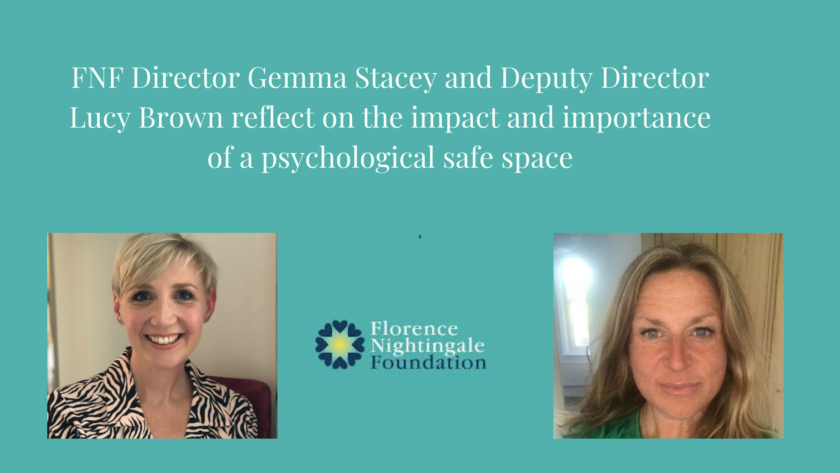
Gemma Stacey and Lucy Brown share their thoughts on the importance of Nightingale Frontline to our nurses and midwives.
At the start of the pandemic the team at Florence Nightingale Foundation (FNF) were faced with a significant challenge. Our ways of delivering our programmes were no longer possible and nurses and midwives across the country were unable to access any form of development. The health and care system was in crisis and the role of FNF in supporting the profession was unclear. What was clear however, was that the FNF team had a motivation and commitment to act. We quickly transformed our ways of working to deliver an online peer group coaching service now known as Nightingale Frontline. We drew upon our network of highly skilled executive coaches who shared our imperative to support the profession and agreed to take a leap of faith. We were unsure how we would create an enabling learning environment with a group of strangers who were connected only by their shared desire to seek a safe space for reflection. We soon realised it was the prospect of anonymity that motivated people to attend.
Within the first week of delivering the service we knew we were providing a reflective learning space that was unique and essential to supporting nurses and midwives to sustain their wellbeing during a period of unparalleled demand. We facilitated sessions for newly registered, staff nurses and midwives, team leaders, senior leaders and executive level nurses. The issues they brought to the sessions were far ranging but centred on the human impact of the pandemic. Nurses and midwives at all levels described feeling scared, insecure and self-critical of their ability to provide or lead safe care. As facilitators, we were enabling a supportive and reflective conversation which gave permission to retell their experiences, validate their emotions and reframe their responses in a way that meant they could keep going. It was a privilege and also an exceptionally holistic perspective on the demands the profession was experiencing.
“As facilitators, we were enabling a supportive and reflective conversation which gave permission to retell their experiences, validate their emotions and reframe their responses in a way that meant they could keep going”
When we set up the service we expected it to be a short-term offer to support the profession in crisis. What has emerged is that the sessions have become even more essential to mitigating the longer-term impact of the pandemic on wellbeing. The sessions have enabled nurses and midwives to discuss issues openly and supported them to stay in the profession. We are no longer dealing with a crisis but finding ways to maintain the energy and resilience required to continue to meet the enduring demand. Coming together with others who share our professional values and remind us of our internal motivations to be nurses and midwives could not be more important. FNF have committed to providing Nightingale Frontline as a benefit of being a member of the Academy. Non-members can also fund sessions by expressing an interest here. What is hugely beneficial is nurses and midwives are equipped to facilitate sessions for their own teams, ensuring a sustainable approach to reflective practice.
“Coming together with others who share our professional values and remind us of our internal motivations to be nurses and midwives could not be more important”
Providing a safe environment for reflective practice should be available to all nurses and midwives throughout their professional life. It is encouraging that systems and policy level commitment is now recognised to achieve this. Investment in the Professional Nurse/Midwifery Advocates is one example of this. We realise the challenge some experience in seeking support from within their employing organisation. Unfortunately the evidence is telling us the perceived stigma is too great and this is where Nightingale Frontline can meet this need.
We are proud to share feedback from not only our attendees but also our facilitators who can share first-hand and what a difference this makes.
Mike Attwood
Mike is an experienced coach, mentor and facilitator working from “Ward to Board” with particular experience of coaching front-line clinicians and Non-Executive Directors and Directors with a clinical background.

How would you describe Frontline?
“It’s essentially peer support. I like to unlock the wisdom of the group, to help them work together. You’re taking a chunk of time out to look after yourself and to have a facilitator work with a group of peers facing the same situation that you are in and enabling you to support each other. It’s safe, it’s confidential because you don’t know each other.
Have you ever had a really good boss that really listens to you? This is what we’re trying to get at. It’s creating space for you to have your voice heard and be listened to and also to help other people here have their voices heard and be listened to. And I don’t know the last time you had five minutes to be listened to without being interrupted.”
Why does Frontline work so well?
“Frontline is really practical. When you’re stressed at work, when you’re very busy, we’re not saying you’ve got to do six webinars, or three hours of meditation. All the evidence is that it really helps calm down and contain stressful work situations and enable people to keep communicating under pressure. Once you’ve practiced it then you’ll be able to use it. And it’s actually quite quick to learn.”
But I’m much too busy to do it…
“Taking time out to think about how to handle a conversation differently, yes, it’s a cost to you in time, but what’s the cost of not doing it? Think of all those stressed conversations, those miscommunications under pressure and the amount of time that gets lost on them. This approach is a small investment for a bigger gain.”
Nadine Jordan
Falls Specialist Nurse, Gloucestershire Hospitals, NHS Foundation Trust

How would you describe your Nightingale Frontline experience?
“It was a really safe space to say, ‘this is how I’m feeling.’ A check that you’re on the right track (how I think that I come across, how I think I lead) and picking up pointers from other people – you know, ‘oh I hadn’t thought about doing things like that!’
I think we all think we live in little silos but actually we all have the same issues. Also, what was reassuring it wasn’t just the people from my trust, it was from a different trust. So you’ve got a starting block. You think, ‘how will we take it forward?’ as opposed to ‘oh we’re stuck now.’
It did help me think, ‘yes, I do know what I’m doing, of course I do.’ It reassured me that actually I was still on the right course. It was very reaffirming and very much led by us as the delegates. It was very useful. I went into it not really knowing what I was expecting but came out of if very positive. It was very helpful.”
Find out more about Nightingale Frontline